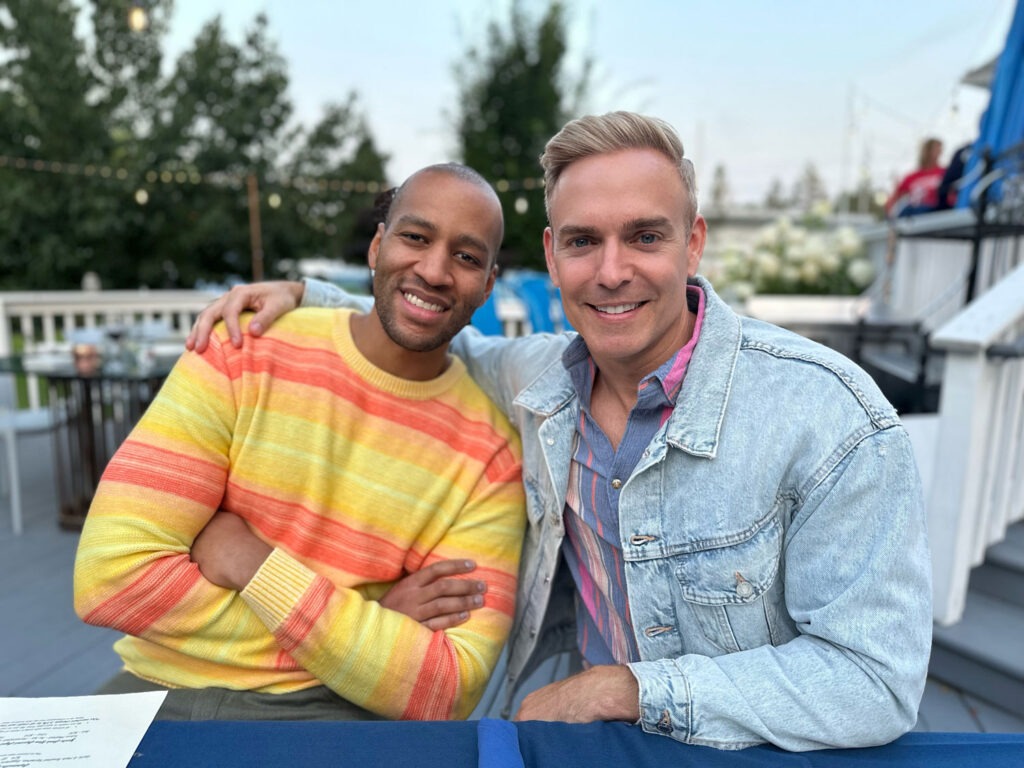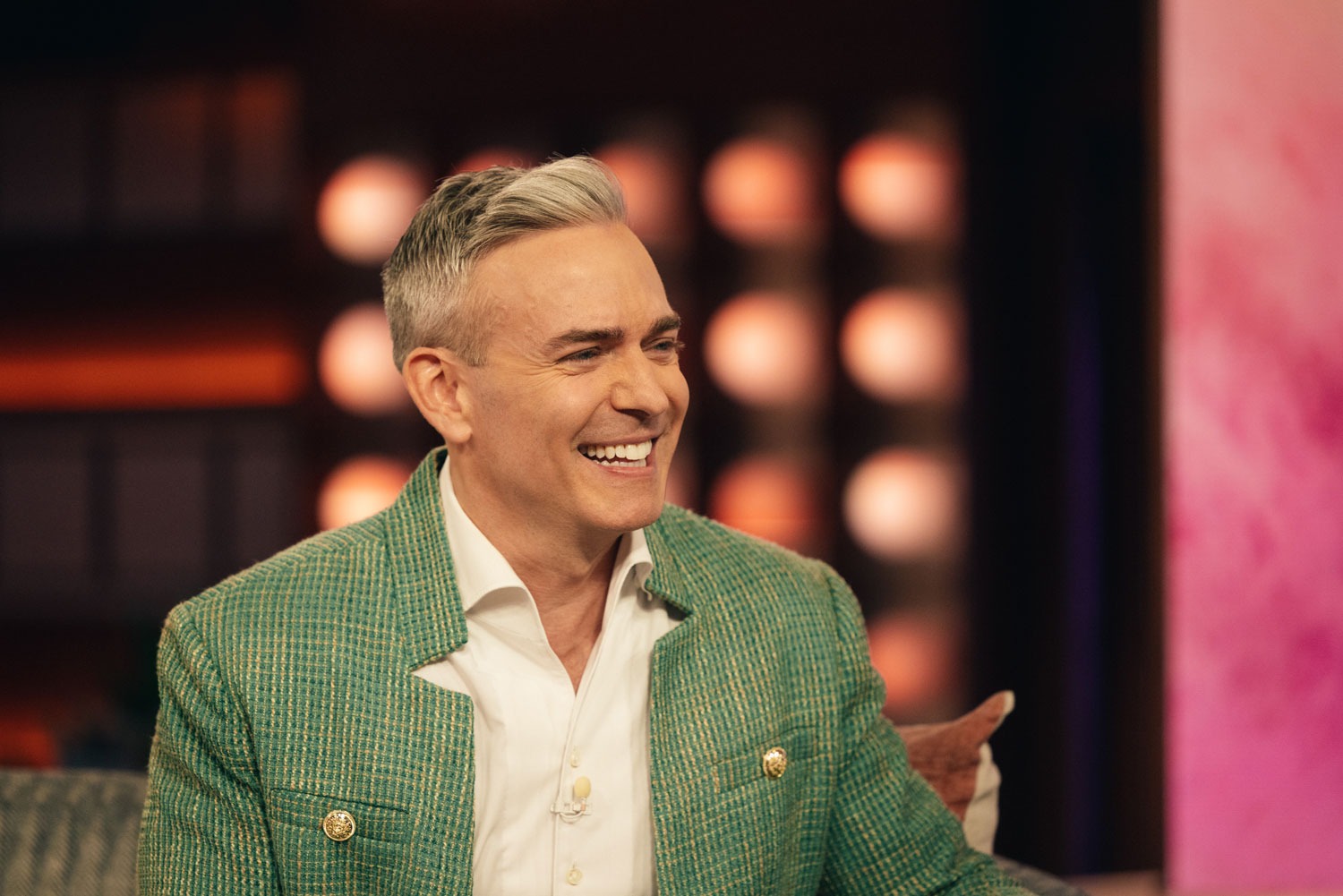As a college student, Emmy Award-winning TV host Matt Rodrigues had a different kind of performance career in mind: He studied acting. But he had a light-bulb moment at graduation, for which he was the class speaker.
“It went really well,” Rodrigues recalls. “Afterward, my acting teachers came up to me and said, ‘Where was that in class? Why didn’t you ever do that?’ I started to realize I’m better at being myself than pretending to be someone else.”
So began a journey that brought him from New York to L.A. to Chicago, where in 2019 Rodrigues became the co-host and producer of the local NBC weekday show Chicago Today. He doesn’t remotely regret his BFA in acting — “It’s helped me in every aspect of my career,” he says. But he found his lifestyle-TV niche by leaning into his innate charm, which includes being an out and proud gay man.
That same effort to live honestly led the 42-year-old South Loop resident to his current project, a Pride Month limited series called It’s OK to Ask Questions. The inaugural season in 2023 featured five half-hour-long interviews with queer luminaries such as Chicago’s own all-star drag artist Shea Coulee and Grammy-nominated songwriter Justin Tranter. Initially produced as special June programming for WMAQ-Channel 5, the show became a hit that spread to other NBC affiliates and was nominated for a GLAAD Award. Now picked up by Peacock, the six-episode Season 2 of It’s OK just launched, helping to anchor the streaming service’s Pride collection. (Starting mid-June, the second season can be streamed on the NBC 5 Chicago News 24/7 live streaming channel). The current diverse crop of subjects includes notable names like comedian Rosie O’Donnell, pop star Jojo Siwa, transmasculine model/artist Chella Man, and Persian-American culinary influencer Zoya Biglary.
Rodrigues sat down with Chicago magazine to talk about his career, marriage, and living his truth while embracing others’.
Because your show explores the personal stories of the LGBTQ people you interview, I wonder if you’ve found yourself reflecting more on your own coming-out process?
Absolutely. I’m in a different place now as a married man in my 40s, which makes it easier to reflect about what it all means. I grew up in a very Catholic family to two insanely loving parents, and it was very challenging when I came out. I always knew I got along better with girls and I was more feminine, but I never thought I was gay until right before I came out, when everything burst open.
I took this acting movement class in college, and the instructor was this very intense, magical woman who talked to us about how the body can hold emotions. Over time, I realized I wasn’t comfortable in my own skin. Through these movement exercises, something started to bubble up in me. I hadn’t even kissed a boy yet, but I started to tell people: “I think I’m gay.”
My brothers were great; all my friends were great. Some people were like, “Duh.” By the time I got to my parents, I thought, “Oh, this is going to be fine. They must already know” — but they didn’t. They’re old school and very Catholic, and it was very hard for them. My dad was very upset; my mom cried and fell to the floor.
I got that reaction, too. Crying moms are one thing, but the collapsing-to-the-floor response felt a bit over the top. It’s like: Geez, mom!
I know! [laughs] They were dramatic about it, but I have to stress: They didn’t say, “Get the fuck out of the house.” It wasn’t like that. It was just absolute confusion, no understanding or support.
You have a very public-facing role in your broadcast career. What’s your experience been as an openly gay man on TV?
When I realized I wanted to be a host instead of an actor, I knew I didn’t want to separate the gay side of myself any longer. That’s what I would do in auditions, right? I’d try to act like a butch guy talking about a girl. I got comments sometimes — “Too gay,” “Too flamboyant,” “Annoyingly gay.” But once I became a host, I figured: If you’re hiring me, you’re hiring me — fully myself, funny, goofy, flamboyant. It took a while, but job by job, I realized people liked who I am when I’m myself.
You’re the executive producer and host of It’s OK to Ask Questions. What was the genesis for the series?
It was really just supposed to be a little Pride special here in Chicago. Our VP Matt Knutson came to me and said, “I feel like you’re in a unique space on Chicago TV, and we should embrace that for Pride. Let’s do something queer-focused.” My first instinct was: Oh nonononono. I’m not educated enough and I’m not connected enough to speak for the queer community. I don’t know what it means to be asexual or nonbinary or intersex. As I was trying to express that in a meeting, I said, “I wish it was OK to ask questions as a gay man. Everybody asks questions of me, but I wish I could ask questions, because I don’t know everything.” Someone stopped me and said, “That’s the title of the show.”
Who would you say the show is geared for? Given the title, it’s clear that a huge piece of what you’re trying to accomplish is to make space for people to grow, even if they have awkward questions.
Completely that. There’s got to be room for grace. People can see how afraid we’ve become in our culture to engage in conversation, because you’re nervous you’re going to offend someone. So it’s about breaking down those walls, with the idea that we can be vulnerable and learn. We have this imaginary viewer, Betty Sue in XY town, and we say, “What would Betty Sue think?”
Now, I think anyone would enjoy It’s OK to Ask Questions, but it’s not made for a hyper-focused queer professor. We are a stepping stone into a bigger conversation. We’re trying to approach Betty Sue who might have a gay friend.
You’re probably understandably proud of booking Rosie O’Donnell for Season 2. But I’ll admit, when I saw the names Shea Coulee and Nick Cave on the Season 1 list, I said, “Hell yeah, that’s a great list!” Which of your guests from either season has surprised you the most?
It’s never the celebrity, even though Rosie is my ultimate get. She’s the reason I got into entertainment and wanted to be a host, so that was a personally incredible moment. But I’ve had conversations with Pidgeon Pagonis about their intersex journey, and I had Cody Daigle-Orians this season talking about asexuality. It’s wild that people are so generous with their spirit and their privacy. I’m so grateful for that, because those conversations are the ones that move the needle. Those conversations are the ones that will reach Betty Sue, and maybe she’ll be a bit more open.

Tell me a bit about life with your husband. How did you meet?
We met in San Francisco in a piano bar. I was on a date with someone else. Brandon is a natural singer, and he was up there, singing by the piano. He walked by after performing “Someone to Watch Over Me,” and we just started talking. Honestly, in that moment, I knew we were going to be together. I just had an instant connection to him. Two weeks later, we had our first date. That was in 2015.
And you got married in 2022, yes?
We got engaged here in Chicago, two years ago in March, and then we got married in Rhode Island, a very small wedding in July. His mom officiated, and my parents were there. We did that so quickly because we got really nervous about what Clarence Thomas wrote when Roe v. Wade was overturned. He took aim at same-sex marriage, and that freaked us out. Still does. We thought, “Let’s get this done, and we’ll do a big party later.”
With you on TV and your husband a surgeon, I imagine it’s tricky to sync your schedules. How do you prefer to spend your free time together?
We eat like pigs. [laughs] We spend way too much money supporting Chicago restaurants. I’m a huge fan of being on the lake in the summertime, either on the beach or on a friend’s boat. And just to gay it up, we love Musical Sundays at Sidetrack. That’s a classic Sunday Funday.



